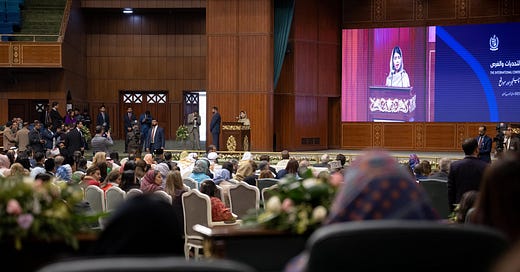Islamabad Declaration on the Education of Girls in Muslim Communities
An Important Tool for Afghanistan
An extraordinary meeting in Islamabad co-hosted by the Prime Minister of Pakistan, the Muslim World League (Rabita), and the Organization of Muslim Scholars has issued an important document, the “Islamabad Declaration on the Education of Girls in Muslim Communities” (attached for download).
I may have more to say about this in the near future. For now let me just quote some key excerpts:
From Islamabad, the capital city of Pakistan, and representing Islamic peoples across various sects and schools of thought, this declaration is issued under the auspices of His Excellency the Prime Minister of the Islamic Republic of Pakistan, Mr. Muhammad Shehbaz Sharif, and in the presence of His Excellency Sheikh Dr. Mohammed bin Abdulkarim Al-Issa, Secretary-General of the Muslim World League and Chairman of the Organization of Muslim Scholars. This international assembly, graced by the attendance of distinguished muftis, scholars, and imams from the Islamic world and minority Muslim communities, convened in response to the initiative promoting girls' education, thereby reflecting Islam's strong emphasis on human rights.
The key statement of the declaration is:
Women's education is a legitimate right unanimously agreed upon by the scholars of the Islamic Ummah. This principle is emanated from the teachings of Sharia, which makes the pursuit of knowledge an obligation for every Muslim, whether male or female. They emphasized that this right must not be restricted by age, level, or specific field of study, and that no reservations on this matter should be attributed to Islamic law. Scholars from various schools of thought and sects, historically and contemporarily, have reached a consensus on the legitimacy of women's education, equating it with that of men.
They emphasized the serious risk of misinterpreting Sharia texts and violating their overarching purposes to legitimize misconceptions about women's education. This includes supporting cultural patterns and traditions or pursuing other objectives. They clarified that such wrongful actions represent one of the gravest offenses against Sharia. . . .
Girls' education is not only a religious obligation but also an urgent societal necessity. It is a fundamental right safeguarded by divine laws, mandated by Islamic teachings, reinforced by international charters, and well-established by national constitutions.
The conference:
Issu[es] a caution against extremist ideologies, fatwas, and opinions rooted in cultural norms and patterns that obstruct girls' education, which constitute a regrettable perpetuation of societal biases against women. Such actions represent a grave misuse of religious principles to legitimize policies of deprivation and exclusion.
The meeting:
Declar[es] that anyone who rejects or opposes these well-grounded Islamic religious principles is, by the consensus of this gathering as referenced in the preamble of this Declaration, considered outside the framework of the Islamic Ummah's concepts and cannot be regarded as part of it. It is essential to disavow their ideology, whether they are an individual, an institution, or an entity—public or private.
Most important, it established a permanent mechanism for implementing the findings of the conference:
[The conference] assign[s] His Excellency Sheikh Dr. Mohammed bin Abdulkarim Al-Issa, Secretary-General of the Muslim World League and Chairman of the Organization of Muslim Scholars, as the initiator of this conference. He is tasked with the responsibility of communicating all resolutions of the conference, overseeing their implementation, and ensuring the necessary financial and moral support. His duties extend to:
- Islamic governments, through His Excellency the Secretary-General of the Organization of Islamic Cooperation, in accordance with the terms of the agreement signed between the two parties.
- Governmental and private educational institutions in Islamic countries and in countries with Muslim minorities.
Skepticism about the outcomes of international conferences is rarely misplaced. I speak as a former organizer of and participant in many. This conference, however, convened participants at an unusually high level; its declaration is entirely devoid of doublespeak and equivocation; and it has publicly announced who is accountable for implementing the declaration. This is, to say the least, out of the ordinary.
Furthermore, while it was never mentioned, the clear target of the conference was the sole government and allegedly Islamic authority in the entire world to ban education for girls, the Afghan Taliban and their “Islamic Emirate.” The co-sponsorship of the meeting by the highest level authorities of the Pakistani and Saudi governments and religious establishments also positions it to have access to and credibility with those among Taliban leaders and the Afghan public (a vast majority) who are appalled by the decrees of the Amir, Shaik al-Hadith Haibatullah Akhundzada banning female education.
The Amir has not shown himself to be open to persuasion by anyone, but the declaration of the conference may serve those in Afghanistan who wish to reverse his retrograde decisions, which contradict explicit promises made by the Taliban during the negotiations in Doha and after their taking power in Kabul in August 2021.





Good luck.